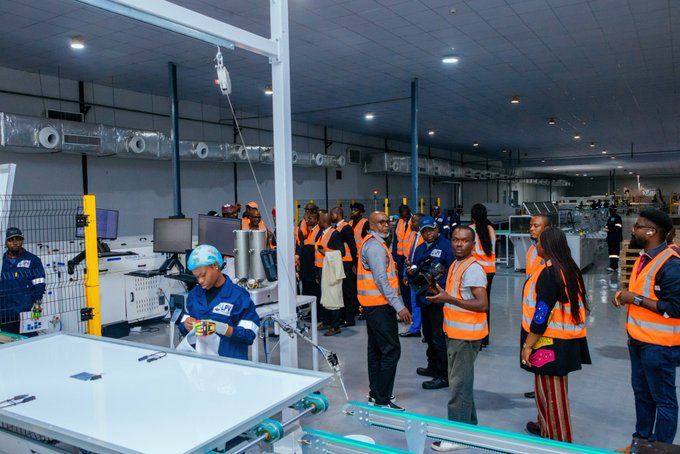
BREAKING NEWS: Nigeria Now Manufacturing Solar Panels, Exports To Ghana
In a landmark moment for Africa’s clean energy landscape, Levene Photovoltaic Technologies in partnership with Nigeria’s Rural Electrification Agency (REA) has reportedly exported locally manufactured solar panels from Nigeria to Ghana. This marks the first known export of Nigerian-made solar panels, signaling a shift from being a major importer to becoming a producer-exporter in the region.
What We Know
The export to Accra, Ghana was confirmed in reports describing the achievement as “historic” for Nigeria’s renewable energy sector.
Levene Photovoltaic Technologies is a key partner of REA. The media reports say this export underscores Nigeria’s maturing solar PV (photovoltaic) manufacturing capacity.
According to statements from REA, Nigeria’s solar panel manufacturing capacity has surged from around 120 MWto 650 MW under the current administration.
Reduced Dependence on Imports
Part of the significance lies in the fact that solar panel imports into Nigeria have dropped sharply—by around 89% in the first quarter of 2025 compared to Q4 2024.
This drastic decline ties in with deliberate government policy to boost local manufacturing, reduce foreign exchange costs, and make solar-energy solutions more affordable within the country.
What Levene / LPV Technologies Bring
Levene Energy Holdings through a division called LPV Technologies (also known as LPVT) operates a solar panel manufacturing plant in Lagos. Their capacity as reported is around 200 MW annually.
Their factory uses European-standard technology, with semi-automated production, stringent quality control, and warranty backing.
Implications: Regionally and for Nigeria
Regional clean-energy leadership: Exporting panels means Nigeria isn’t just serving its own demand but also contributing to regional energy access in West Africa.
Local jobs & economy: Building up a manufacturing base means more jobs, skills development, and backward linkages (suppliers, services).
Energy security & cost reduction: Less dependency on imports helps reduce supply chain delays, import duties, and exposure to foreign currency risk.
Caveats & What to Watch
Verification: The export reports come from media outlets; full details (quantities, specifications, value of the panels, whether they fully meet import country standards) remain to be publicly confirmed.
Quality & certification: For exported panels to truly compete, they must meet rigorous international standards. Any lapses could affect warranties or performance reputations.
Scaling up: While 200-MW and 600-MW capacity figures are promising, global demand is large—and for Nigeria to become a consistent exporter, further increases in capacity, local supply chain development, and policy support will be needed.
What This Means
This development marks a turning point. It’s an encouraging sign that Nigeria’s renewable energy strategy—anchored in local manufacturing, policy push, and strategic public-private partnerships—is starting to pay dividends. If the momentum continues, Nigeria could become a clean energy hub for West Africa, exporting beyond Ghana and reducing the continent’s reliance on imported solar technology.
About Author
Discover more from BillionBill
Subscribe to get the latest posts sent to your email.


